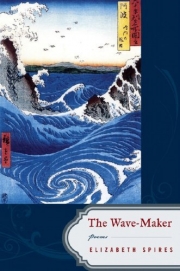Ann Kolakowski

by Elizabeth Spires
W.W. Norton
2008
$23.95
In an interview published earlier this year, Elizabeth Spires was asked how her work has matured since the publication of her first book of poetry in 1981. She replied: “A friend of mine, the poet Michael Waters, joked, saying you’ve written about birth, and you’ve written about death, what’s left? I don’t know.” If Spires doesn’t know, it’s not because she hasn’t been asking herself the question.
Indeed, in The Wave-Maker, her sixth book of poems, the poet returns to familiar ground as she offers an extended meditation on the meaning of life as wife, daughter, mother, friend, and spiritual seeker. Spires certainly isn’t the first poet to explore these themes, but for the Ohio native they constitute comfortable terrain—a heartland of the very best kind—to which she is compelled to return. “Down on her knees,” she writes in the title poem, “she lets the old familiar rollers wash her clean, / & sighing, takes in all the changes since she has last been.”
Although Spires left Ohio for Vassar in the early 1970s and has remained on the East Coast—she now lives in Baltimore, MD, where she is a professor of English at Goucher College—she never abandoned her Midwestern roots (ironically fitting, it seems, for someone raised in a town called Circleville). Spires embraces this fact, introducing the first section of the book with a passage from Dorothy Sayers’ Gaudy Night that reads, in part: “Then, with many false starts…, returning and filling and erasing painfully as she went, she began to write again, knowing with a deep inner certainty that somehow, after long and bitter wandering, she was once more in her own place.
Other territory that Spires reclaims in this collection is the complicated landscape of the spirit. These poems, however, are refreshingly filtered through a Buddhist lens rather than the Catechism one might expect from a recently returned Catholic. “I think a lot of people walk away from organized religion, sometimes permanently,” she observed in the aforementioned interview. “For some, though, it’s a circular journey, and they eventually return and rejoin the fold. But leaving and coming back to a creed or religion is different from staying inside it your whole life and never questioning.” These are poems that question from the inside. “What if there is no quiet place / where the heart can sit?” she ponders in “A Small Voice Asks Some Large Questions”. And, like the contemplative setting of “Sunday Morning at the Carmelite Monastery,” the pages of The Wave-Maker offer the reader a place “come to sit quietly. / To be filled up.”
Occasionally, the clear and accessible style that wins Spires a more general audience gets her into trouble. A few of the 35 poems in the collection contain clichés (“the day clear as a bell” from “Fog Spirit”; “the hose coiled like a snake” in “Back Yard”), and some of the personal elegies follow a predictable, sentimental arc, such as “The Snowy Day,” which ends:
Later, after you died, I had a dream. The phone was ringing.
It was you, your voice, on the other end of the line, laughing
as you said, “Beth, it’s Greg. I’m in the hospital. I’m not dead.”
Although readers have no reason to doubt the pain of the poet’s loss, they will find it more authentically—and universally—expressed in “Snail Revisited,” one of three standout poems concerning the ignoble gastropod:
& I pallbearer of one carried you outside
where no sun wind rain could restore you the worst
I won’t tell (what Death will do to the body) finally
you were only a shell a monument a memory
Likewise, in the playful “Zazen,” which takes its name from the Buddhist sitting meditation, Spires fixes her gaze with great effect on another humble creature, a cricket:
Nights now, when I bring down the laundry,
I see you kneeling on the cold hard floor,
a monk without a mat. It’s warm enough, yes,
but what do you eat? Drink?
Do you conjure miracles, small ones, in the dark?
Moment to moment, does your zazen preserve
this house, and all within, from destruction?
This poem also reveals another of Spires’ underrated qualities: her dry wit. It shines, too, in “Sims: The Game,” in which the popular computer game is explained by a child:
Adults can get married but it’s hard to get married
You tell them to propose but they can’t make the decision
on an empty stomach or they’ve just eaten & are too tired
To have a Baby click Yes or No & a baby carriage rolls up
But Spires is at her best in “Nightgown,” in which the speaker imagines life from the perspective of a garment:
And although I, unlike you, must make do
without head or heart, I can imagine a future
you cannot: where, filled with a wild winter emptiness,
I fly over a streaming patchwork countryside
to see what has so far eluded me:
the white world written on with white writing!
With its heavy alliteration and praise of the ordinary, the poem echoes Gerald Manley Hopkins in a most pleasing way, calling to mind such lines as the closing of “God’s Grandeur”:
Oh, morning, at the brown brink eastward, springs—
Because the Holy Ghost over the bent
World broods with warm breast and with ah! bright wings.
If the nightgown must exist without head or heart, thankfully the poet doesn’t. The Wave-Maker will please fans of Elizabeth Spires—and garner her new ones.
The Wave-Maker, Elizabeth Spires. W.W. Norton, 2008. ISBN: 978-0-393-06659-3
$23.95
Work Cited:
Walsh, William. “Charming Banter: An interview with Elizabeth Spires & Madison Smartt Bell.” The Writer’s Chronicle Feb. 2008, 8-17.

